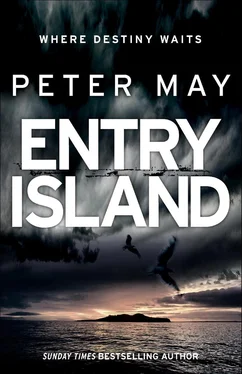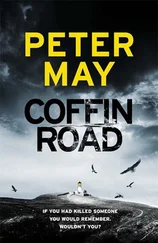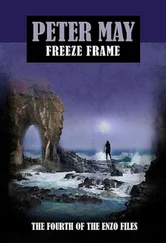Onshore I could see a collection of long sheds, and woods rising up on the hill behind them. From the wooden pier a long boat set out towards us, water from its oars catching the dying light as it dropped, like liquid silver, back into the stream of the river.
A man came aboard in coat tails and boots and heavy trousers. He wore a hat above a gaunt face with sunken cheeks. One of the crew said to me, ‘That’s the doctor.’
‘Anyone speak English?’ the doctor said.
After a moment I raised my hand. ‘I do, sir.’
‘What language do these people speak?’
‘Gaelic.’
‘Damn,’ he said. ‘Our Gaelic translator died two days ago. You’ll have to do it.’ He took several strides towards me and gave me a good looking at. Then opened my shirt and examined my chest. ‘You look healthy enough for the moment.’ He spoke a strange, nasal drawling sort of English. ‘I’m going to have to examine these folk to see who’s sick and needs treatment. The rest of you will be kept in the Lazarettos at the top end of the island.’
‘Lazarettos?’
‘Just huts, son.’ He looked around. ‘I guess the sick are still below deck.’
They finally got us all ashore. Ferried on longboats and gathered together on the pier in the dark, lanterns held above us on poles. A collection of miserable souls, dressed in rags, filthy hair long and unkempt, beards tangling on cadaverous faces. Not a single person wore shoes. One man was dressed in a woman’s petticoat, given him by the captain’s wife to hide his modesty. His humiliation was acute.
Thirty-nine sick people, most of whom could not walk, were taken directly to the hospital sheds. The remainder of us had whatever goods we had brought with us removed by men wearing masks and gloves who moved among us like servants of death. Fortunately, the captain’s wife had possession of my diaries, so they were kept safe.
Catrìona Macdonald was taken with the rest of the sick to the hospital, and I was left in charge of her children, holding the baby in my arms. We were herded on to carts then, to make the short journey to the north-east end of the island.
The doctor sat up on the cart beside me and the children. I could almost feel his fatigue. ‘I’ve seen things,’ he said, ‘that no man should see. I’ve seen suffering that no human being should have to endure.’ He turned to look at me with empty eyes. ‘I used to be a religious man, son. But if there’s a God, then he abandoned us a long time ago.’
Our sorry convoy moved off through the night, a lantern on each cart. The track cut inland, the sea somewhere away to our right. On our left lay what the doctor described as a mosquito-infested lagoon. Cholera Bay, he called it. Where the Eliza had anchored, he said, was known as Hospital Bay.
Nearly a hundred thousand people had come through Grosse Île this year alone, he told me. Most of them off boats from Ireland. He said that people were dying there in their tens of thousands from the potato famine. And I knew just how that must be.
‘Five thousand poor souls have died from typhoid on Grosse Île in the last seven months,’ he said. ‘It’s what most of the sick on the Eliza have, too.’
‘Will they die?’ I asked.
‘Some of them. The strongest will survive. All things considered, we do not do that bad a job. But our ambulance doubles as a hearse. And it’s at work twenty-four hours a day, seven days a week.’ He shook his head. ‘We’ve lost two drivers to typhoid already this year, and half of our translators.’
I had no idea what to say to him. Five thousand dead? It was unimaginable. We passed through the only village on the island. Houses and a church set back along either side of the road. I said, ‘Who lives here?’
‘The quarantine workers and their families,’ he told me. ‘Doctors, nurses, translators, administrators, drivers. And the men of God, of course. Come to see first hand what hell Heaven has wrought on earth.’ His disillusion and lack of faith was almost painful, and I found it hard to meet his eye. And I wondered, too, what kind of people would come and work in a place like this, and bring their families to live here with them.
Beyond the village, the land levelled off, and we were closer again to the sea. Finally we saw the Lazarettos, long shadows in the dark, set in rows overlooking a rocky shore.
When we dismounted, the doctor told me they were sure to call on my services again, and he thanked me for my patience before heading off back to the village. But he is wrong, for I have no patience. I have no desire to be in this place, and will leave it just as soon as I can.
A quarantine worker led us to the last of the huts. It seemed endlessly long, partitioned along its length, open doorways leading from one section to the next. Walls and roof and beams were crudely whitewashed. Oil lamps hung from the ceilings, and shadows lurked and moved like ghosts among the hundreds of people lying side by side on long trestles set against either wall. A double-tier trestle runs down the centre of the hut, groaning with bodies, a single sheet covering eight or ten souls at a time.
This is to be our home for the next days or weeks, until we either come down with the typhoid and die, or survive and move on to the next phase of this hellish journey.
The children clung to my legs as we shuffled in to claim our space on wooden shelves scarred by the graffiti of all those desperate people who have gone before us, and stained by God knows what excretions.
The nursing woman took Catrìona Macdonald’s baby to feed her. We would eat shortly, they said. And for that I was grateful. But all I wanted was to be gone.
It is hard to say that I feel better, but after three square meals I am physically stronger.
The doctor who met the boat came looking for me this morning to tell me that the administrator wanted a word. I rode back through the island with him on his cart, and he pointed out the armed guards posted on the edge of the village nearest the Lazarettos. ‘There are shifts of them night and day,’ he said.
I looked at them in surprise. ‘Guards? What are they guarding?’
‘Against folk in quarantine straying into the village or trying to escape. It’s a dreadful thing, the typhoid, son. The authorities’ll do anything to keep it contained.’
There were children playing among the houses in the village as we went through it, and they stopped their games to watch us pass. Dark eyes filled with caution that made me feel like those lepers they speak of in the Bible.
The administration hut was close to the pier, a long shed with windows looking out over the bay. The administrator himself was a Scotsman from a place called Dumfries. He said he had been working here more than ten years. I asked him if he wasn’t afraid of catching the typhoid. He just smiled and said the fear never leaves you. But that if he’d been going to catch it he reckoned he’d have got it by now.
‘You speak the Gaelic, I’m told,’ he said, and I nodded. ‘We have translators for most languages here, but we recently lost our Gaelic speaker. Actually, he was Irish, but he seemed able to talk to the Scots well enough.’
The administrator turned to gaze out of the window at all of the boats anchored in the bay.
‘I wonder if you might be able to help us with a wee problem we have. An Irishman called Michaél O’Connor who arrived here on the fifth. He doesn’t appear to speak any English.’ He turned back to look at me. ‘The man’s demented. Even turned violent once or twice. He hitches a ride on the ambulance and comes here two or three times a day shouting and screaming. Maybe you could talk to him for us. Find out what the hell it is he wants.’
I found Michaél O’Connor in Lazaretto No. 3, and was surprised to discover that he was not much older than myself. He was sitting at a table on his own, staring into space. Most men, it seems, shave and get their hair cut after a day or two here, but Michaél had a thick black beard on him, and his hair was shoulder-length, matted and knotted. He looked at me with the palest of blue Celtic eyes, empty of any emotion.
Читать дальше












